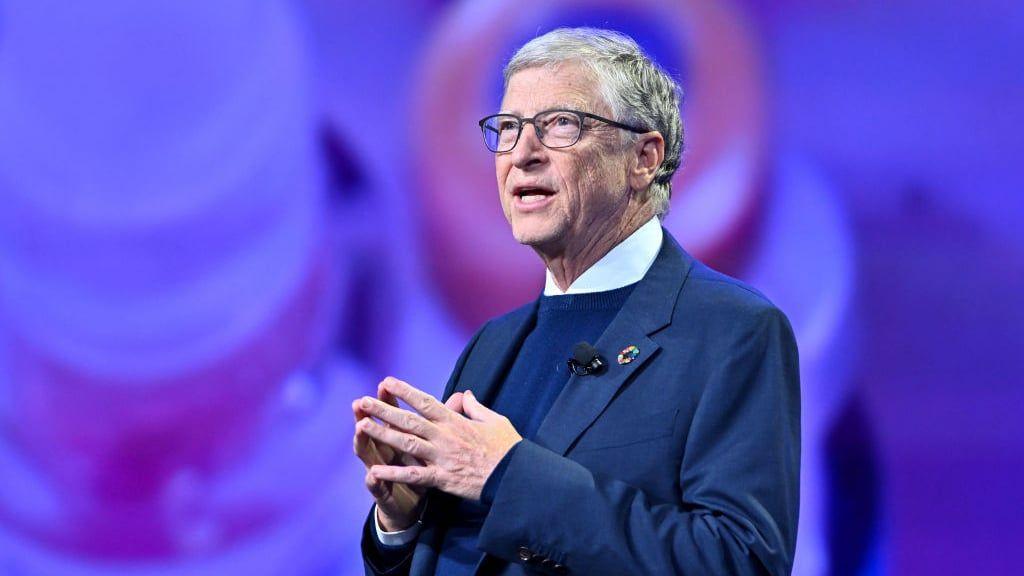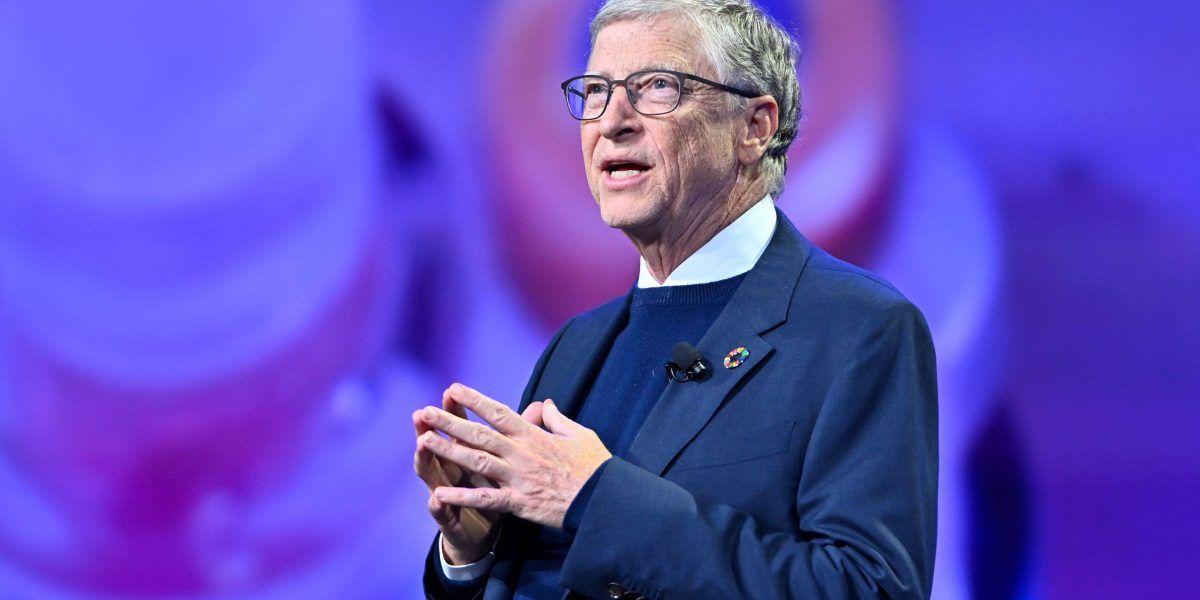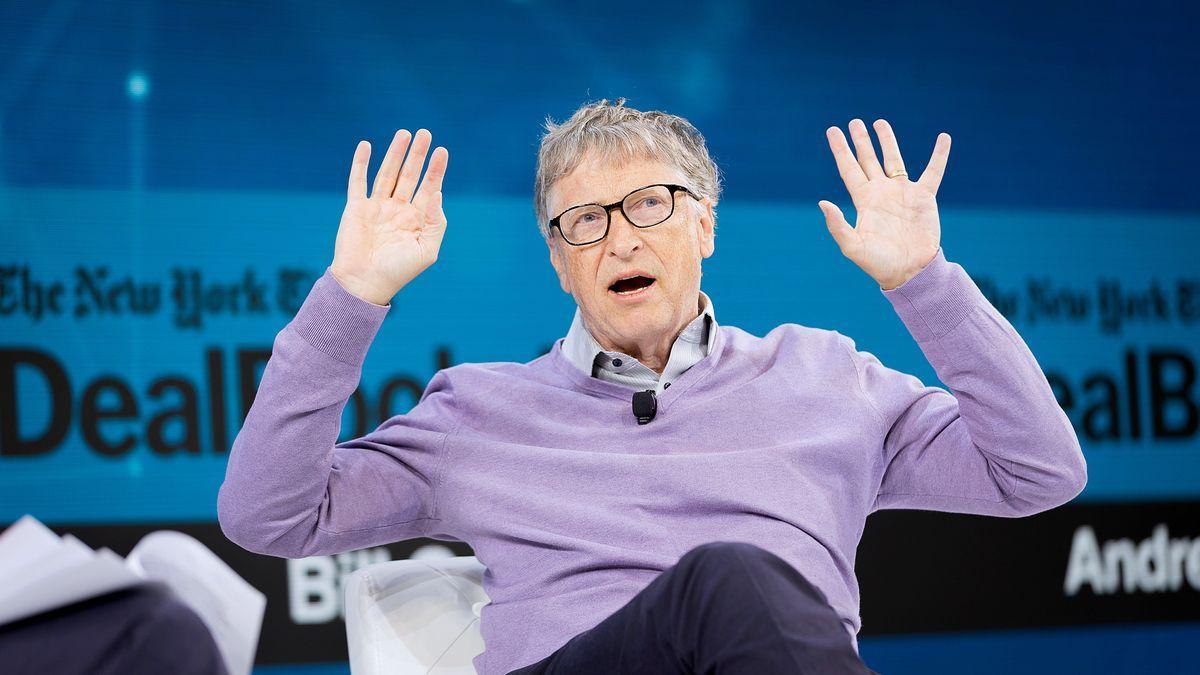Bill Gates Predicts AI-Driven Two-Day Work Week Within a Decade
5 Sources
5 Sources
[1]
Will AI lead to shorter workweeks? Bill Gates, Elon Musk, and others say yes
Serving tech enthusiasts for over 25 years. TechSpot means tech analysis and advice you can trust. What just happened? There are plenty of justifiable concerns over what impact AI will have on the workplace of the near future. Bill Gates is one big tech name who believes the technology will have benefits, though, including a two- or three-day work week in the next decade. That's probably welcome news for those whose jobs haven't been replaced by AI, and provided their employers don't pay them part-time wages. Speaking to Jimmy Fallon on The Tonight Show recently, Gates predicted a future in which humans will no longer be necessary "for most things" because of advanced AI. It's a view shared by Elon Musk, who in 2023 told then-UK Prime Minister Rishi Sunak that artificial intelligence will eventually replace all human jobs as it would be able to "do everything." For those who haven't been replaced, Gates asked, "What will jobs be like? Should we just work like 2 or 3 days a week?" It's not the first time that Gates has predicted AI leading to shorter work weeks. He said in 2023 that a three-day work week was possible thanks to a potential future where "machines can make all the food and the stuff, and we don't have to work as hard." Gates highlighted some of the benefits of having more free time, including better help for older people and smaller class sizes. Others painting a rosier picture of an AI future include JPMorgan CEO Jamie Dimon, who said the next generation of workers will have 3.5-day workweeks and live to 100 because of the technology. Some companies are already moving to four-day workweeks, though it's usually related to increasing productivity rather than AI. In Japan, a nation famous for working excessively long weeks, The Tokyo Metropolitan government is experimenting with a four-day workweek. It's hoped that the change will help the country's declining population problem by ensuring women do not have to sacrifice their careers due to life events such as childbirth or child-rearing. Gates also told Fallon that over the next decade, AI will ensure "great medical advice [and] great tutoring" become free and commonplace, which doesn't sound very promising for health professionals and teachers. "There will be some things that we reserve ourselves for, but in terms of making things and moving things and growing food - over time, those will be basically solved problems," Gates said. Many in the AI industry, including OpenAI CEO Sam Altman and Microsoft AI CEO Mustafa Suleyman, have warned about the massive impact AI will have on the global workforce. Altman has long pushed for a universal basic income as a solution, while Suleyman said the tools are "fundamentally labor replacing."
[2]
Bill Gates says 2-day work week is coming -- thanks to AI
Bill Gates believes the future of work could look radically different -- and it may only require a two-day work week, thanks to AI. Speaking on the The Tonight Show with Jimmy Fallon, Gates posed a hypothetical question: "What will jobs look like in the future? Should we work just two or three days a week?" For Gates, the technological shift could be transformative. AI, he believes, has the potential to solve many global challenges, such as shortages of healthcare professionals and mental health experts. This would inevitably reshape the job market and ultimately transform the way we think about intelligence. However, tech productivity has, in some instances, made employees' work days longer. "The era we're entering is one where intelligence is rare," Gates said, pointing to the value of a "great" doctor or teacher. "With AI, over the next decade, that will become free and commonplace," he added. Gates, who co-founded Microsoft (MSFT-3.29%) and has since become a leading philanthropist through the Bill & Melinda Gates Foundation, has been a strong supporter of technology's role in solving global issues, particularly in health, education, and climate. While promoting his new book, "Source Code," Gates emphasized AI's potential in fighting diseases like Alzheimer's, malaria, and HIV. He also spoke about his work to eradicate polio, a viral disease that impacts children under the age of five. "With luck, within the next three to four years, polio will become the next disease that's fully gone," Gates said. Gates also expressed optimism about the future of climate change, saying he believes innovation will lead to more sustainable, affordable solutions, especially in green technologies. "We need to make really cheap green products," he said. With the right innovations, the future looks brighter than many might expect, with AI playing a pivotal role. However, he cautioned, it may not be linear. "People should be willing to pay extra for clean products, but on a global scale, they probably won't," Gates added.
[3]
Forget 70 hour work-week. Why Bill Gates thinks a 2-day work week is coming in next 10 years
Bill Gates reveals names of four Indians he would love to have dinner withBill Gates envisions a future where artificial intelligence dramatically reshapes the workforce, potentially reducing the standard workweek to just two days within the next decade. The Microsoft co-founder believes that rapid advancements in AI-driven automation will significantly lessen the need for human labor, impacting multiple industries and professions. Gates has long discussed the potential of AI to revolutionize various sectors, and he recently reiterated this vision on The Tonight Show. His remarks, originally aired in February, have resurfaced, sparking renewed discussions about AI's role in redefining employment and productivity. He suggested that AI could alleviate workforce shortages, particularly in fields like healthcare and education, by making high-quality medical advice and tutoring more accessible to the masses. The prospect of shorter workweeks is not a new idea for Gates. In 2023, during the rise of AI tools like ChatGPT, he speculated that society might eventually transition to a three-day workweek. Now, with AI's rapid evolution, his predictions have become even bolder, pointing to a world where automation handles most routine tasks in manufacturing, logistics, and food production, making human intervention increasingly unnecessary. Among the professions set to undergo the most significant transformation, Gates highlighted medicine and education. AI-powered tools could provide medical diagnoses, mental health support, and personalized learning experiences, reshaping how people access these essential services. While he acknowledged that certain human-centric activities, such as professional sports, will remain untouched, he foresees AI-driven solutions becoming the norm across multiple industries. As AI continues to evolve, Gates remains optimistic about its potential to drive progress. However, the uncertainty surrounding its long-term impact leaves many wondering: will the world truly embrace a two-day workweek, or will the shift be more complex than anticipated?
[4]
AI will cut your workweek to 2 days, says Bill Gates -- but warns it may shrink your paycheck too!
Bill Gates predicts that in the next decade, artificial intelligence (AI) could drastically change the workforce, reducing the traditional workweek to just two or three days. As jobs evolve and AI handles more tasks, society will need to rethink how people spend their time. Gates suggests this shift could improve productivity, combat burnout, and even boost birth rates. However, the future of work remains uncertain, leaving room for both challenges and opportunities.If the idea of a five-day grind doesn't sit well with you, there may be good news ahead. Bill Gates believes artificial intelligence (AI) could shrink the workweek to just two or three days within the next decade. Speaking on The Tonight Show with Jimmy Fallon, the Microsoft co-founder questioned the future of work itself. "What will jobs be like? Should we just work like 2 or 3 days a week?" Gates asked. His prediction is based on AI's rapid progress, which he believes will render human labour unnecessary for most tasks. This isn't the first time Gates has suggested a fundamental shift in work culture. In 2023, he speculated that a three-day workweek could become the norm, as AI takes over more responsibilities. "If you zoom out, the purpose of life is not just to do jobs," he said on Trevor Noah's What Now? podcast. A move towards fewer working days could significantly impact employees worldwide. Many workers are already struggling with burnout and exhaustion, especially in the wake of the pandemic. Studies suggest that cutting the workweek from five to four days improves productivity while reducing stress. One company reported a 24% rise in efficiency and a 50% drop in burnout after shortening its workweek. Governments are also experimenting with reduced work hours. Tokyo's Metropolitan Government recently embraced a four-day workweek to help address Japan's declining birth rates. While some leaders are optimistic about a shift away from long hours, others remain hesitant. JPMorgan CEO Jamie Dimon has also acknowledged AI's potential to make work less of a priority, estimating a three-and-a-half-day workweek in the future. Yet, despite this view, JPMorgan recently enforced a strict five-day in-office work policy, suggesting that such changes may take longer to materialise. With AI advancing rapidly, some professions are more vulnerable to automation than others. Gates highlighted two key fields -- healthcare and education -- as those most likely to be transformed. "With AI, over the next decade, (intelligence) will become free, commonplace -- great medical advice, great tutoring," he told Fallon. While he acknowledged that some jobs -- such as professional sports -- will remain human-led, he envisions a world where AI handles most production, transportation, and even food growth. "There will be some things that we reserve ourselves for, but in terms of making things and moving things and growing food -- over time, those will be basically solved problems," he added. Gates is not alone in his vision of an AI-driven workforce. Elon Musk has similarly suggested that AI could eventually make traditional jobs obsolete. Speaking with former UK Prime Minister Rishi Sunak in 2023, Musk predicted, "There will come a point where no job is needed -- you can have a job if you want one for personal satisfaction, but AI will be able to do everything." He even suggested that societies may need a "universal high income" rather than just a basic income to support people in an AI-dominated world. Gates' views carry weight because of his deep involvement in shaping the modern tech landscape. He once tracked his employees' car number plates to monitor their hours -- something he admitted publicly -- but today, his perspective has shifted. As AI disrupts traditional industries, he believes society will need to rethink what work means and how people spend their time. The big question remains: if AI frees up most of the workweek, what will people do with all that extra time?
[5]
Bill Gates insists: "AI will replace humans for most things" - Softonic
As artificial intelligence accelerates its transformation of the world of work, Bill Gates has once again highlighted the deep changes AI will bring to society. In a recent interview, the Microsoft co-founder warned that many current jobs are likely to disappear, as machines become increasingly capable of performing tasks that previously required human intelligence. Gates emphasized that humans were not born to work, but rather forced into jobs by scarcity and necessity. As AI progresses, he argues, we will move away from this scarcity-driven model and into an era of abundance, where machines handle much of the labor. This will offer people significantly more leisure time, although adapting to this shift will require a major cultural and psychological adjustment. Despite his optimism about AI's potential, Gates noted that only a handful of professions are likely to resist automation. Among these are biologists, energy experts, and coders -- fields he believes are too complex for AI to fully replace in the short term. Interestingly, some industry leaders, including NVIDIA's CEO, have questioned whether coding itself may soon be obsolete, further narrowing the list of resilient careers. Looking to the future, Gates envisions a scenario where AI could lead to a two-day work week within a decade, as productivity increases and automation handles more tasks. In this world, humans will be able to choose which aspects of work they want to retain, delegating the rest to machines. For now, the challenge lies in reshaping mindsets to embrace this new paradigm.
Share
Share
Copy Link
Bill Gates envisions a future where AI advancements could lead to a two-day work week, reshaping the job market and societal norms. This prediction sparks discussions on the potential benefits and challenges of AI-driven workforce transformation.

Bill Gates Predicts AI-Driven Transformation of Work
Microsoft co-founder Bill Gates has recently made headlines with his bold prediction that artificial intelligence (AI) could lead to a two-day work week within the next decade. Speaking on The Tonight Show with Jimmy Fallon, Gates posed the question, "What will jobs be like? Should we just work like 2 or 3 days a week?"
1
AI's Impact on Various Industries
Gates believes that AI will dramatically reshape the workforce, potentially reducing the need for human labor across multiple industries. He envisions a future where AI-driven automation handles most routine tasks in manufacturing, logistics, and food production, making human intervention increasingly unnecessary
3
.Healthcare and Education Transformation
Among the professions set to undergo significant transformation, Gates highlighted healthcare and education. He predicts that within the next decade, AI will make "great medical advice [and] great tutoring" free and commonplace
1
. This could potentially alleviate workforce shortages in these critical sectors by making high-quality services more accessible to the masses2
.Potential Benefits and Challenges
Gates suggests that this shift could improve productivity, combat burnout, and even boost birth rates. In Japan, for instance, the Tokyo Metropolitan government is experimenting with a four-day workweek to address the country's declining population problem
1
.However, Gates also warns that while AI might reduce work hours, it could potentially shrink paychecks as well. This raises questions about income distribution and economic stability in an AI-dominated future .
Shifting Perspectives on Work
Gates emphasizes that humans were not born to work, but rather forced into jobs by scarcity and necessity. As AI progresses, he argues, we will move away from this scarcity-driven model and into an era of abundance, where machines handle much of the labor. This transition will require a significant cultural and psychological adjustment
5
.Related Stories
Other Tech Leaders' Views
Gates is not alone in his vision of an AI-driven workforce. Elon Musk has similarly suggested that AI could eventually make traditional jobs obsolete, predicting that "AI will be able to do everything." Musk even proposed the idea of a "universal high income" to support people in an AI-dominated world .
The Road Ahead
As AI continues to evolve rapidly, the future of work remains uncertain. While some leaders are optimistic about a shift away from long hours, others remain hesitant. The challenge lies in reshaping mindsets to embrace this new paradigm and addressing the potential economic and social implications of such a dramatic shift in the nature of work
5
.References
Summarized by
Navi
[4]
Related Stories
Bill Gates Predicts AI Will Replace Most Human Jobs Within a Decade
27 Mar 2025•Technology

Bill Gates Warns of AI's Rapid Progress and Its Impact on the Future of Work
02 Aug 2025•Technology

Bill Gates warns AI will transform society more than any human invention, cites bioterrorism risk
09 Jan 2026•Policy and Regulation

Recent Highlights
1
Google Gemini 3.1 Pro doubles reasoning score, beats rivals in key AI benchmarks
Technology

2
Meta strikes up to $100 billion AI chips deal with AMD, could acquire 10% stake in chipmaker
Technology

3
Pentagon threatens Anthropic with supply chain risk label over AI safeguards for military use
Policy and Regulation





